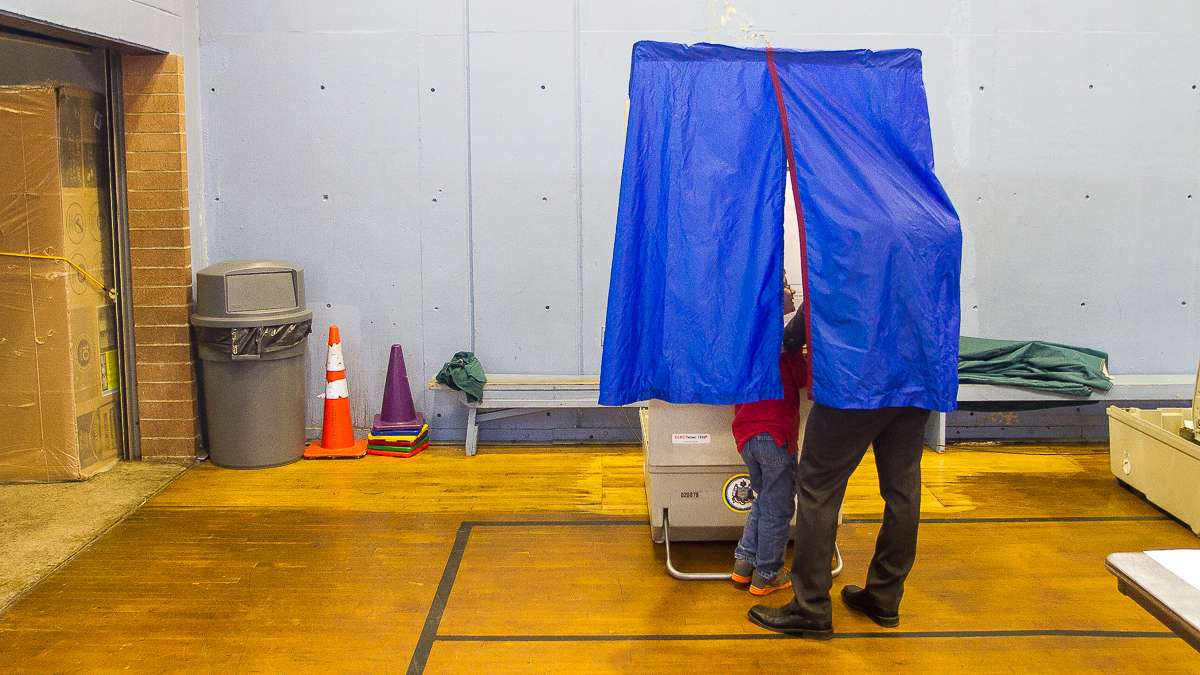The other midterm wave: A center-left sensibility

(NewsWorks File Photo)
If the newly empowered Republicans start claiming that they’ve won an ideological mandate to move America rightward, there’s a cinch way to refute them.
Just cite these midterm election stats, which suggest that America, on a range of key issues, now has a center-left sensibility:
1. At a time when Republicans in Washington continue to insist that raising the minimum wage would kill jobs or wreak economic havoc, the voters in four red states – South Dakota, Arkansas, Alabama, and Nebraska – approved ballot measures, by landslide margins, to raise the minimum wage.
2. At a time when Republicans in Washington continue to tilt their policies to favor the top income brackets, 64 percent of voters nationwide believe (according to the exit polls) that the U.S. economic system “favors the wealthy” at the expense of “most Americans.” That jibes with the ’14 national surveys, where roughly 60 percent of Americans complain that upper-income people and corporations pay too little in taxes.
3. At a time when Republicans in Washington still insist that climate change is a myth, 57 percent of voters believe (according to the exit polls) that climate change “is a serious problem.”
4. At a time when Republicans in Washington continue to block immigration reform and to denounce paths to citizenship as “amnesty,” 57 percent of voters believe (according to the exit polls) that illegal immigrants should be “offered a chance to apply for legal status.”
5. At a time when Republicans in Washington continue to insist that every last vestige of Obamacare should be swept from the earth, nearly half the voters believe (according to the exit polls) that Obamacare should stay the same or be strengthened further.
6. Voters in blue-state Oregon and red-state Alaska voted decisively to legalize marijuana and sell it on the retail market. Voters nationwide said in the exit polls, by 49-47 percent, that marijuana should be legal. In Florida, 58 percent of the voters said yes to medical marijuana (which failed on the ballot onl because the state required 60 percent for passage).
7. Extremist anti-abortion ballot measures – seeking to define newly-fertilized eggs as people – were soundly rejected in Colorado and North Dakota. The hostility toward that measure was so strong in Colorado that GOP Senate candidate Cory Gardner, who had sponsored such a personhood bill in the House, felt compelled to denounce it as a “bad idea.” (En route to victory, Gardner also moved leftward on contraception – declaring that birth control pills should be available over the counter.) Indeed, voters nationwide said in the exit polls, by 52-43 percent, that abortion should be legal.
8. In the exit polls, voters were asked whether any of these Republicans would be good presidents: Jeb Bush, Chris Christie, Rand Paul, or Rick Perry. In terms of a thumbs-up, none got higher than 29 percent.
And remember, this midterm electorate was older, whiter, and more male than the far more diverse electorate that typically turns out in presidential years. All of which prompts the key question:
If even these voters have a center-left sensibility (populist on economic issues, tolerant on social issues, wary of Republican presodential hopefuls) what explains their apparent cognitive dissonance, their decision to sweep the board clean and hand the Republicans both congressional chambers? Why, for instance, would Iowa voters choose as its new senator an anti-abortion zealot like Joni Ernst, even though 57 percent of them support legal abortion (go figure)?
Answer: The midterm election was mostly a thumbs-down referendum on President Obama’s performance, not on the policies that he and the Democrats espouse. Basically, Obama was rebuked for not delivering the stuff that most people actually favor – starting with economic fairness.
The macro stats look great (plunging jobless rate, record-high Dow), but everyday people don’t feel it in their everyday lives. Heck, even tea-partying Republicans felt compelled to adopt center-left populist rhetoric; for instance Arkansas’ winning Senate candidate Tom Cotton: “If you make a living off of assets or investments, like stocks or bonds – the top five percent of all income earners – you’re doing OK….But if you make a living by working, if your labor is your means of putting food on the table, your incomes are down.”
So for Democrats, here’s the bottom line: Voters’ agreement on your issues isn’t worth a damn if you can’t deliver on your issues.
——-
I had much more to say today as the studio guest on WHYY’s Radio Times. The podcast, here.
Follow me on Twitter, @dickpolman1, and on Facebook.
WHYY is your source for fact-based, in-depth journalism and information. As a nonprofit organization, we rely on financial support from readers like you. Please give today.

